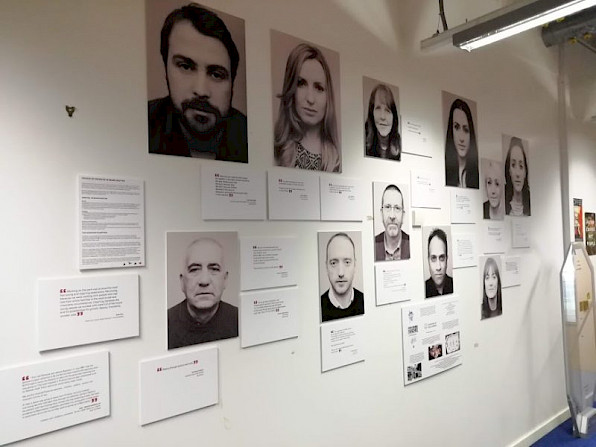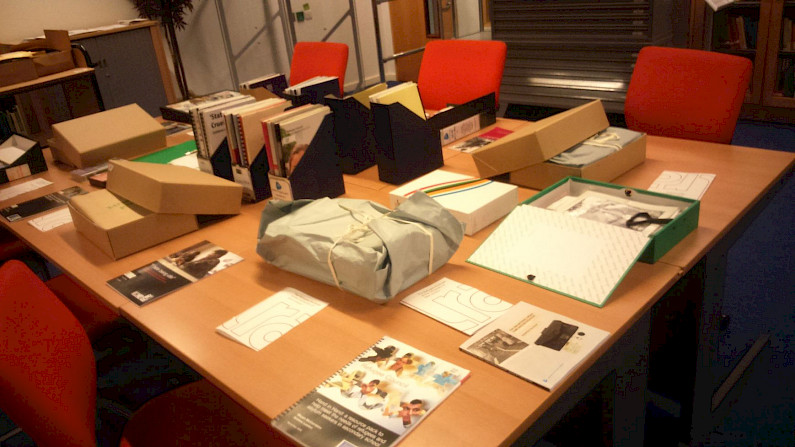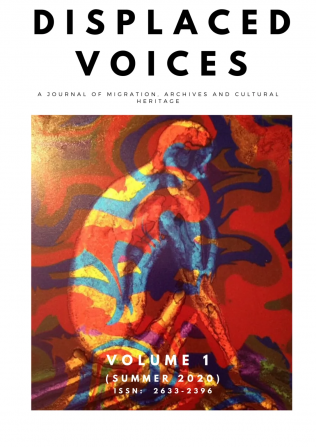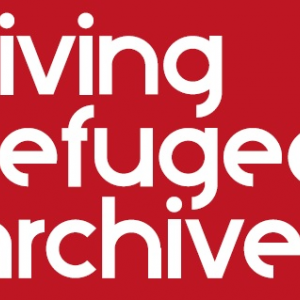This post, by Paul V. Dudman, introduces the Living Refugee Archive digital portal and ongoing archival work with the Refugee Council Archive at the University of East London, reflecting on how we document, preserve and make accessible stories and testimonies of displacement:
Refugee experiences have the ability to help shape and enhance our understandings of migration and encourage a more positive discourse on issues of migration, displacement and racism. Digital archival repositories like Making Home Away, and the Living Refugee Archive based at the University of East London represent examples of how institutions can engage with complex narratives and storytelling and develop new archival methodologies to working with under-represented communities and the ethics of narrative reproduction.
“Enough with the empire of trauma! A critical mass of articles and incendiaries, reflections and rallying cries, has skewered the notion that refugee storytelling is somehow inherently useful, and that ‘giving voice’ is a benevolent practice – especially when these practices are predicated only on tragic tropes, and silence people as critical and active(ist) subjects.” (Western, 2020)
At the recent History Acts 22 online event on Recording a Crisis, I spoke about our activist work with the Living Refugee Archive and the importance of making an space in which communities could feel comfortable making their voices and community histories available. One of the core reasons for establishing the Living Refugee Archive was to help begin the process of making our collections more accessible beyond the traditional archival space, to help democratise the archival service that we offer and to support and help communities to engage with our collections.

By establishing the Living Refugee Archive and continuing our community engagement work, we want to challenge the notions that the only displaced voice that is acceptable, is the one that focuses on a story of trauma and dispossession to engender a sense of sympathy from the reader. We want our archival collections to represent a site of agency and empowerment, where communities feel comfortable engaging with the materials that we hold in an open and accessible fashion, where their story will be listened to, and where it can act as a source of inspiration and empowerment for others. In the words of the Manchester Refugee Support Network archive: “you might think there is something contradictory about a refugee archive: archives are the permanent repositories of physical history, whilst refugees are transitory and homeless – those who have lost their history.” (Ahmed Iqbal Ullah Race Relations Resource Centre, 2016). A decolonial space that facilities communities to curate and tell/re-tell their stories in their own words and to facilitate the preservation of, and access to, their own heritage. There has been “much talk about “decolonising” collections; not deleting old tellings of stories, but enabling communities to produce and curate their own narratives.” (Islam, 2019).
We must continue to explore the complex interplay of refugee stories and wider historical narratives, which often seem to de-historicise refugee movements, thereby relegating refugees to the mere flotsam of history. Do refugees always “present as victims, marginalised and erased from history, or as deliberate agents? How do refugees become historians (or indeed archivists) of their own displacement, seeking to gain the recognition of each other and of posterity.” (‘About the Project’, 2018). We must explore and engage with new methodologies and methods of archiving and representation of the materials within our care. Our new digital archive on Voices from the Jungle Digital Testimony Archive, for example, focused on testimonies from residents of the former Calais Jungle collected as part of an educational project undertaken within The Jungle by colleagues from our UEL Centre for Narrative Research. This included both Visual Storytelling and Participatory Photography workshops as part of the 'Crafting multimodal narratives in the Calais camp’ project and resulted in the publication of Dzhangal, a book encapsulating images captured within the Calais Jungle accompanied by testimonies from the participants.
“It was big trouble when I came here. I can’t believe this is Europe? Where is humanity, where is democracy? I think, because we have come here, we are not human beings; we become animals, a new kind of animal. A new kind of animal that has developed at this time. It’s known as 'refugee.’” ('Africa’ in Dzhangal, p.14)
Dzhangal also reflects on the author and photographer’s forensic approach to the collection of artefacts from the Calais Jungle from which the photographs for the book were derived and the role that forensic archaeology can play in enabling a greater contextual understanding of the importance of objects and the stories that they can tell alongside more traditional modes of narrative storytelling.
“The process of compiling physical evidence to account for “others”, making “sense” of their difference, and, thereby, of the collector’s power to examine, name, bracket and administer, has a long and violent history.” (Malaquais, p. 74)
Our civic engagement and outreach work to date with the Refugee Council Archive at UEL and the Living Refugee Archive, in conjunction with wider external activism, has been rewarded with external networking and partnerships helping to facilitate the preservation of community heritage and new participatory approaches to accessing cultural heritage. Collaborative projects like Crossing the Borders (Steel, 2018), a Heritage Lottery Funded project developed and run by the Wai Yin Society in Manchester to document the history of the Chinese community in the city, shows the potential for collaboration between archival repositories and BAME communities. Displaced communities have a right to history and for their cultural heritage to be documented and made accessible. Our own oral history work with refugees in East London has highlighted the importance of documenting displaced voices in terms of empowerment and agency and as a “project of human rights.” (Hashem and Dudman, 2016).

To succeed, digital archives like Making Home Away and the Living Refugee Archive need to reflect and consider the impact of (enforced) mobility in the search for and the remaking of “home” and the impact of these movements in “underscoring testimonies of migration, displacement and resettlement.” As is evident in both of these projects, digital archives must look to engage with both cross-disciplinary approaches to engage with those who are displaced, whilst attempting to engage in multi-modal approaches to the collection and hosting of “archival” materials. We have learnt through our archival work addressing both the theme of “refugeeness” as well as collecting in other core areas including Olympic history and theatre studies, that we perhaps need to do more to encourage these collections within our care to speak to one another and to encourage interactions and engagements between collections to encourage responses to the array of stories within our care, and to facilitate the cross-pollination of knowledge between the collections that we hold.

The Living Refugee Archive can be found online here; we have recently published the first volume of our new journal: Displaced Voices: A Journal of Archives, Migration and Cultural Heritage.
The Living Refugee Archive portal was initially funded by the UEL Civic Engagement Fund and now operates in association with the Refugee Council Archive at UEL. The project is run by lead investigators Paul V. Dudman (University of East London) and Dr. Rumana Hashem (University of Warwick). For further information, please contact: [email protected]
References and Resources
Ahmed Iqbal Ullah Race Relations Resource Centre, (2016) ‘The Manchester Refugee Support Network archive: A right to history’, Reading Race, Collecting Cultures, 14 December.
Dudman, Paul V. (2020). 'Book Review: Mendel, Gideon (2017): Dzhangal. London: GOST Books ISBN: 978-1-910401.15-6.’ in Displaced Voices: A Journal of Migration, Archives and Cultural Heritage, Volume 1, pp. 6-11.
Hashem, R. and Dudman, P. V. (2016) ‘Paradoxical narratives of transcultural encounters of the “other”: Civic engagement with refugees and migrants in London’, Transnational Social Review, 6(1–2), pp. 192–199. doi: 10.1080/21931674.2016.1186376.
Islam, S. (2019) Engaging with race, ethnicity and migration. Manchester: Manchester Race Archive, p. 3.
Gideon Mendel. (2017) Dzhangal. GOST Books
Western, T. (2020) ‘The Active Citizens Sound Archive’, Refugee Hosts, 2 April.
